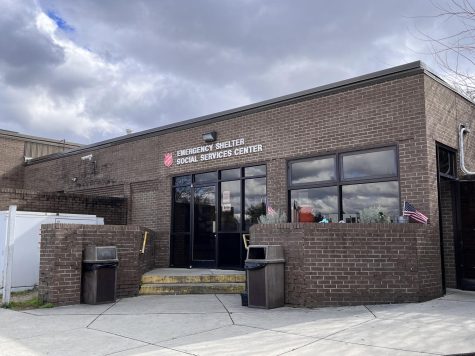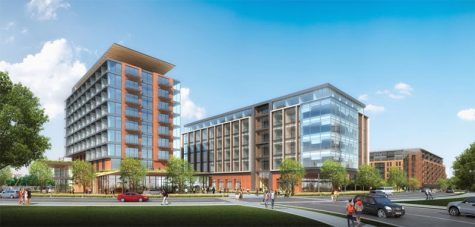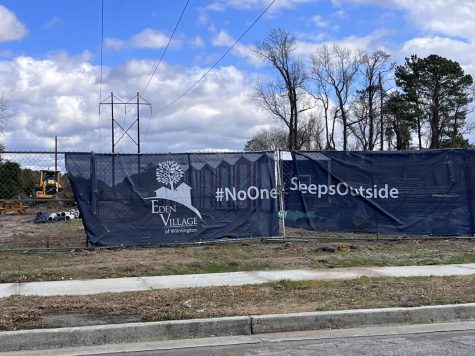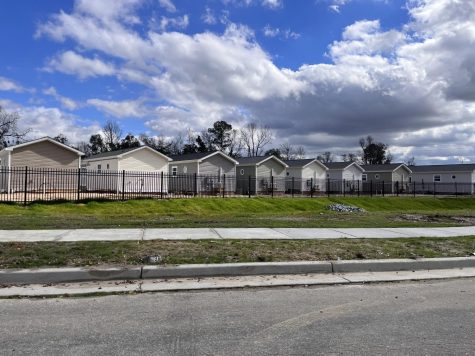The Salvation Army’s downtown shelter set to close, new location under construction
On Jan. 10, Wilmington’s city council voted unanimously to purchase The Salvation Army’s N 2nd St. property for $4.8 million. The city is currently leasing the property to the organization until its eventual closure in May of this year. A new facility off Martin Luther King Jr. Pkwy. is still under construction and will not be completed for at least a year.
Originally purchased in 1979, the property currently houses the organization’s homeless shelter, which serves five counties, including New Hanover. The building is also home to a thrift store and social services center.
Major Ken Morris has worked for The Salvation Army for more than 30 years and currently heads the organization’s Cape Fear operation. According to Morris, they have been working on a campaign to build a larger campus in Wilmington for over a decade.

“It was determined a number of years ago that the funds were not coming in as fast as anticipated,” said Morris. “So, we decided we might need the proceeds from the existing shelter to give us the boost that we needed to move forward with our campaign.”
By selling their downtown location, the organization hopes to generate enough funding to build on land they already own off Martin Luther King Jr. Pkwy. The 22-acre site will house two new buildings including a much larger shelter and community center.
“We’ve decided that it’s easier for the residents if everyone is on the same level. We’re currently dealing with bunk beds, which can get a little crowded,” said Morris.
This issue was compounded by the COVID-19 pandemic, which cut the shelter’s total bed capacity in half from 50 to 25 due to social distancing regulations. According to Morris, regulations have become less restrictive since then, but they remain a challenge for the shelter.

The organization will continue to rent the property under a lease agreement with the city until May. Morris said that during that time, they are confident they will be able to find new housing for residents in the absence of their shelter. The organization also plans to set up social work offices in their Hamstead thrift store and The Harrelson Center downtown.
“Not only are we going to continue to help the homeless, we’re going to put an even greater emphasis on helping people stay in their homes, and prevent them from becoming homeless,” said Morris. “We’re not stopping any of our programs, we’re actually expanding services.”
According to Morris, it’s difficult to produce an accurate timeline for the construction of the new campus due to the high cost and relatively low productivity of construction work post-COVID. Current estimates range anywhere from one to three years until opening.
“We don’t really know the exact timeline yet,” said Morris. “We want to get this exciting new shelter built as quickly as possible.”

While The Salvation Army uses funds from the sale to construct their new campus, the purchase appears advantageous for the city as well. The property is right next to the planned site of the “Gateway Project,” a $90 million public-private partnership to develop three vacant city blocks between Third and Front St. The current proposal includes the addition of a new hotel, residential apartments, parking and retail space.
The exact details surrounding the project are still under discussion with the city council according to Dylan Lee, a representative for the city.
“It’s all still conceptual at this point,” said Lee. “In the next couple of months, the city will develop a memorandum of understanding with our private partner known as East West.”
A memorandum of understanding (MOU) is a written agreement between the city and developer East West that will establish the inclusion of beneficial public spaces, such as sidewalks, parking and affordable housing.
“The city wants to make sure the northern gateway area develops in the long-term interests of the city and downtown,” said Lee. “By owning those properties, we get to have a say in what gets built there. It’s an important and strategic area, and that’s why the city chose to purchase those properties.”
While the city will eventually demolish The Salvation Army building following the closure, they don’t have any plans to build on the property yet. According to Lee, funding and development oversight for new construction could come from the Gateway Project directly, or as part of the city’s larger initiative to develop the downtown waterfront.

In addition to The Salvation Army’s planned shelter, another national organization known as Eden Village is nearing completion on their tiny home community for the homeless across the street from the planned campus. The two organizations said they will work together to better serve the community in as many ways as possible.
The gated community will offer 31 tiny homes for $300 a month including utilities for those who are unable to afford traditional housing. They’ll also offer small heated and air-conditioned sheds that anyone facing homelessness can walk up to and spend the night in, dubbed “God Pods.”

Dr. Thomas Dalton, the founder of Eden Village’s Wilmington operation said the organization’s goal is to improve the longevity and quality of life for single adults facing chronic homelessness—meaning they’ve been without a home for more than a year.
“The life expectancy of someone living on the street is 50 years old. The average age of our residents is 55, and have been on the street for seven years,” said Dalton. “Dignity is the solution to poverty.”
According to the National Alliance to End Homelessness, on any given night more than 580,000 people across the U.S. won’t have a home to sleep in. Organizations like The Salvation Army and Eden Village are working every day to change these statistics.
To learn more about the work of The Cape Fear Salvation Army, or to make a donation towards the construction of their new shelter, visit here. You can also donate or learn more about Eden Village of Wilmington by visiting here.











